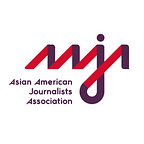Resume Tips for Journalists With Yung AAJA, from Benét J. Wilson and Michael Huang
Benét and Michael spoke about “channeling your inner Chad” and crafting a resume that stands out
By Yi-Shen Loo, Programs and Special Initiatives Coordinator
On October 4, with job and internship application season in full swing, AAJA’s Young Professionals Network (known fondly as Yung AAJA) hosted a virtual resume workshop with Benét J. Wilson, director of the Poynter-Koch Media and Journalism Fellowship and former senior editor at The Points Guy, and Michael Huang, managing editor of sports at The Philadelphia Inquirer. Gwendolyn Wu, Yung AAJA co-director and reporter for BioPharma Dive, moderated the session as they covered the do’s and don’ts of resumes, gave tips on interviews and shared anecdotes from their time as hiring managers.
Benét and Michael started off with brief presentations on their make or breaks for resumes, bringing in their various work experiences and perspectives as BIPOC in journalism. “I want to make sure journalists of color can compete,” Benét said.
She hopes to ensure that young journalists of color have a fair chance in employment with standout resumes and has been offering career advice for decades, earning her the nickname “Aunt Benét” to the many she has taken under her wing. She shared her top ten tips for resumes.
At the end of her presentation, Benét stressed the importance of having a conversation grabber in your resume, offering her own example. “I auditioned for ‘Jeopardy!’ and almost made it to the final round,” she said. “It’s the last thing on my resume, and there hasn’t been one interview I’ve had when people haven’t asked me about being on ‘Jeopardy!’”
Michael’s presentation similarly covered how to be professional in a resume. With over 25 years of experience, Michael has been a mentor to many young sports journalists. “There is a certain amount of corporate speak that you’ll probably have to learn,” he said.
Apart from learning the right terms to put forth in a resume, his key piece of advice is this: “Be very proud of your BIPOC heritage and your gender.” With many newsrooms rethinking the diversity of their staff, being in the minority will put you at an advantage.
In order to make yourself stand out, Michael explained, add what makes you unique on your resume. From there, a candidate will be able to catch the eye of the recruiter and make it to the interview round. “When you get to the interview, that’s when the sell begins,” Michael said. “The resume is just something for the employer to reference to start conversation and ask questions. But to be honest, it’s not always make or break.”
“Be very proud of your BIPOC heritage and your gender.”
After their presentations, Benét and Michael answered questions from the audience. On interview tips, Benét said, “Carry yourself with the confidence of a mediocre white man. And get yourself a name. My mediocre white guy is Chad,” she offered. “When you have that in your head and you’re doing that interview as mediocre white guy Chad, it’s very powerful.”
To wrap up the session, Michael said that it’s okay to let your employer know if you are interviewing at other organizations. A good employee would naturally be recruited by other companies. As a manager and editor, Michael’s motto is “Train them so that people will want them, but treat them so they’ll want to stay.”
For more valuable lessons in professional development and how to get your foot in the door in journalism, stay tuned for the next Yung AAJA event.
To stay up to date on more events like this from AAJA chapters and affinity groups, check out our events calendar. Connect with Benét Wilson and Michael Huang. To learn more about Yung AAJA, subscribe to their newsletter or follow Gwendolyn Wu, Rachel Ramirez and Grace Moon on social media.
Liked this piece? Share it on social media and follow AAJA Defined as we continue to chat with AAPI journalists and share their stories.
Yi-Shen Loo is the Programs and Special Initiatives Coordinator at AAJA. She is based in California. Connect with her on LinkedIn.
